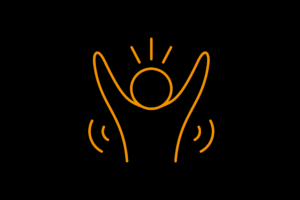Everyone on the planet has sensory processing differences, which is why everyone has different likes and dislikes when it comes to things like food and music. But sensory differences are often more extreme in autistic people, compared to others.
-
- If you are sensitive to sound, a shop can feel TOO LOUD with people chatting, background music and the annoying beeps at the checkout.
-
- If you are sensitive to light, it may be really hard to look up from the desk at school when the lights, or the light of the teacher’s smart board are REALLY BRIGHT.
-
- If you have a lower sensitivity to balance, you may find it REALLY HARD TO SIT STILL when you are trying to focus on doing something.
Sensory differences can be helpful, or not so helpful, depending on the situation.
One Autistic Person’s Sensory Experience
“I have a lower sensitivity to smell. This is bad sometimes, as I can’t smell things well that I enjoy the smell of, like cake! BUT it is also good sometimes, as I am less likely to be grossed out by smelly farts!
Because I am more sensitive to sound than other people, I notice a lot of sensory beauty that others miss, such as the sounds of birds in the woods. But I find it hard when I am in a place that is too loud so I often wear headphones.”
When it comes to each of the senses, you can have a higher sensitivity, a lower sensitivity, or a mixture of both! This can change because of the amount of energy you have, your level of stress, or your sensitivities can just change over time.
Having these sensory differences can be hard. Sometimes we can feel many things all at once and want less sensory input, then at other times we can need more sensory input to help us feel ok.
Because of our sensory differences, some of us use repetitive movements or sounds to feel calm, happy and able to concentrate. This is called stimming and you can read more about it here.
Have you noticed your sensory differences?
Once you begin to understand your sensory differences, there are lots of things which can help
-
- If you are finding a place too loud, you can wear headphones to reduce the noise or listen to music.
-
- If you are finding a place too smelly, you can have an item with you that smells nice.
-
- If you are finding a place too bright, you can wear sunglasses.
You can learn more about each one of your senses by clicking on the links below. It may surprise you to see that there are actually 8 different senses:
The 5 senses most people have heard of:
The 3 “hidden” senses that most people don’t think about:
The amount of sensory input you have affects how you feel. So working out what input is helpful for you and how to avoid harmful input is really helpful. Read more about being “sensory smart” here.



